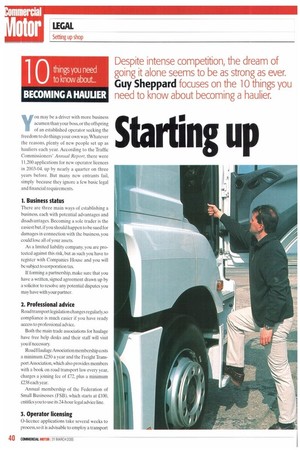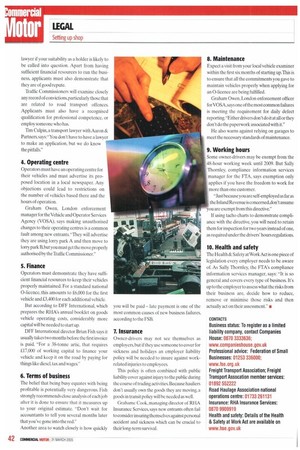Starting up
Page 42

Page 44

If you've noticed an error in this article please click here to report it so we can fix it.
you may be a driver with more business acumen than your boss, or the offspring of an established operator seeking the freedom to do things your own way Whatever the reasons, plenty of new people set up as hauliers each year. According to the Traffic Commissioners' Annual Report, there were 11,200 applications for new operator licences in 2003-04, up by nearly a quarter on three years before. But many new entrants fail, simply because they ignore a few basic legal and financial requirements.
1. Business status
There are three main ways of establishing a business, each with potential advantages and disadvantages. Becoming a sole trader is the easiest but, if you should happen to be sued for damages in connection with the business, you could lose all of your assets.
As a limited liability company, you are protected against this risk, but as such you have to register with Companies House and you will be subject to corporation tax.
If forming a partnership, make sure that you have a written, signed agreement drawn up by a solicitor to resolve any potential disputes you may have with your partner.
2. Professional advice
Road transport legislation changes regularly,so compliance is much easier if you have ready access to professional advice.
Both the main trade associations for haulage have free help desks and their staff will visit you if necessary.
Road flaulage Association membership costs a minimum £250 a year and the Freight Transport Association, which also provides members with a book on road transport law every year, charges a joining fee of £72, plus a minimum £238 each year.
Annual membership of the Federation of Small Businesses (FSB). which starts at £100. entitles you to use its 24-hour legal advice line.
1 Operator licensing
0-licence applications take several weeks to process, so it is advisable to employ a transport lawyer if your suitability as a holder is likely to be called into question. Apart from having sufficient financial resources to run the business, applicants must also demonstrate that they are of good repute.
Traffic Commissioners will examine closely any record of convictions, particularly those that are related to road transport offences. Applicants must also have a recognised qualification for professional competence, or employ someone who has.
Tim Culpin, a transport lawyer with Aaron & Partners,says:"You don't have to have a lawyer to make an application, but we do know the pitfalls."
4. Operating centre
Operators must have an operating centre for their vehicles and must advertise its pro posed location in a local newspaper. Any objections could lead to restrictions on the number of vehicles based there and the hours of operation.
Graham Owen, London enforcement manager for the Vehicle and Operator Services Agency (VOSA), says making unauthorised changes to their operating centres is a common fault among new entrants. "They will advertise they are using lorry park A and then move to lorry park abut you must get the move properly authorised by the 'Raffle Commissioner."
5. Finance
Operators must demonstrate they have sufficient financial resources to keep their vehicles properly maintained. For a standard national 0-licence, this amounts to £6,000 for the first vehicle and £3,400 for each additional vehicle.
But according to DFF International, which prepares the RHA's annual booklet on goods vehicle operating costs, considerably more capital will he needed to start up.
DFF International director Brian Fish says it usually takes two months before the first invoice is paid. "For a 38-tonne artic, that requires £17.000 of working capital to finance your vehicle and keep it on the road by paying for things like diesel, tax and wages.
6. Terms of business
The belief that being busy equates with being profitable is potentially very dangerous. Fish strongly recommends close analysis of each job after it is done to ensure that it measures up to your original estimate. "Don't wait for accountants to tell you several months later that you've gone into the red."
Another area to watch closely is how quickly you will be paid — late payment is one of the most common causes of new business failures. according to the FSB.
7. Insurance
Owner-drivers may not see themselves as employers,but if they use someone to cover for sickness and holidays an employer liability policy will be needed to insure against workrelated injuries to employees.
This policy is often combined with public liability cover against injury to the public during the course of trading activities. Because hauliers don't usually own the goods they are moving, a goods in transit policy will be needed as well.
Grahame Cook, managing director of RHA Insurance Services says new entrants often fail to consider insuring themselves against personal accident and sickness which can be crucial to their long-term survival.
8. Maintenance
Expect a visit from your local vehicle examiner within the first six months of starting up. This is to ensure that all the commitments you gave to maintain vehicles properly when applying for an 0-licence are being fulfilled.
Graham Owen, London enforcement officer for VOSA .says one of the most common failures is meeting the requirement for daily defect reporting.-Either drivers don't do it at all or they don't do the paperwork associated with it."
He also warns against relying on garages to meet the necessary standards of maintenance.
9. Working hours
Some owner-drivers may be exempt from the 48-hour working week until 2009. But Sally Thornley, compliance information services manager for the FTA, says exemption only applies if you have the freedom to work for more than one customer.
"Just because you are self-employed as far as the Inland Revenue is concerned,don't assume ou are exempt from this directive."
If using tacho charts to demonstrate compliance with the directive, you will need to retain them for inspection for two years instead of one, as required under the drivers' hours regulations.
10. Health and safety The Health & Safety at Work Act is one piece of legislation every employer needs to be aware of. As Sally Thornley, the FTA's compliance information services manager, says: "It is so general and covers every type of business. It's up to the employer to assess what the risks from their business are, decide how to reduce, remove or minimise those risks and then actually act on their assessment."•
CONTACTS
Business status: To register as a limited liability company, contact Companies House: 0870 3333636; www.companieshouse.gov.uk Professional advice: Federation of Small Businesses: 01253 336000; www.fse.org.uk Freight Transport Association; Freight Transport Assocation member services: 01892 552222 Road Haulage Association national operations centre: 01733 261131 Insurance: RHA Insurance Services: 0870 9909919 Health and safety: Details of the Health & Safety at Work Act are available on www.hse.gov.uk






















































































































































































































